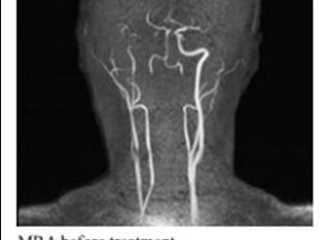N. Nazarova, K. Fedorov
Moscow, Russian Federation
Background and aims: HSV infection is a rare case of cerebral vasculitis. Case Report: A 34-year-old female presented to the stroke unit in June 2013 with a severe headache, vomiting, depressed consciousness and left sided focal deficit. Brain magnetic resonance tomography (MRI) revealed multiple cortical and subcortical strokes of the right hemisphere. On admission no stenosis of cerebral arteries were found. Wight blood cell count was increased. Cerebrospinal fluid (CSF) was normal. Extended examination excluded connective tissue diseases and primary antiphospholipid syndrome. Thrombophylia genes showed heterozygote mutations. Patient was treated with anticoagulant, dexamethasone, aspirin and statin. She recovered well within two weeks to a mild hemiparesis. In July 2013, brain magnetic resonance angiography MRA showed absence of the blood flow in right anterior and middle cerebral arteries. MRI revealed thickening and contrast enhancement of the right internal carotid and the proximal part of middle cerebral arteries walls. There was anti-HSV immunoglobulin M plasma increase, CSF was positive for HSV DNA. Intravenous acyclovir was started. After treatment HSV was eliminated from CSF but MRA showed no improvement. Oral prednisolone and rivaroxaban were administered. In August 2013, MRA revealed cerebral arteries recanalization with a slight residual extra- and intracerebral arteries narrowing. Prednisolone was tapered off. In September 2014, she was symptom free. Results: Acyclovir administration led to elimination of HSV from CSF but recanalization of cerebral arteries was achieved after steroid treatment only. Conclusion: MRI of the vessel wall in conjunction with CSF investigation for viral DNA should be performed for the evaluation of unexplained stroke in young individuals. Disclosure: Nothing to disclose
16 октября 2015 г.
Ещё больше полезной информации на нашем Телеграм-канале



